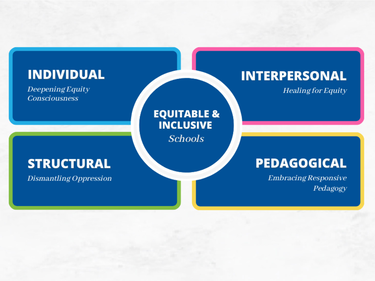
Equity Framework
Abbotsford School District is committed to ensuring that every student receives the support they need to access the high-quality education they deserve. Equity is the state that would be achieved if success was not predictable by any social, cultural or economic factor. It involves celebrating the individual cultures, talents, abilities, languages, and interests of every student by ensuring they have the necessary opportunities to fulfill their aspirations. The Equity Framework captures how we must act in the service of our students, particularly those who are historically underserved.
Our Equity WorkNational Equity Project
Individual
Deepening Equity Consciousness
Who am I (identity, privilege and bias)? What kind of leader do I need to be right now?
The Individual Lens asks us to interrogate our assumptions, biases and beliefs about others and explores how mindsets can impede or ignite progress in the classroom, school and district. It pushes us to explore our own identities in relation to others and to think about the consequences of our actions, particularly in relation to underserved students.
Guiding Questions:
- Do staff recognize the importance of (their own and their students’) positive belonging and personal identities?
- Are issues of privilege, bias and racism raised and addressed as possibly impacting learning in the school?
- Are there opportunities for adults to develop skills and understanding of diverse worldviews, perspectives and pedagogies?
Interpersonal
Healing for Equity
How will I build trust across differences? How will I create space for reflection and healing?
The interpersonal Lens invites us to explore the nature of our connectedness and the kinds of discourse we have within our school communities about various student populations. The core of the Interpersonal Lens is engaging a diverse array of stakeholders in authentic and collaborative experiences to develop solutions to complex issues.
Guiding Questions:
- How do the adults describe the achievement profile of diverse learners?
- Is professional discourse respectful of the diverse groups of learners, their families, and their communities?
- Does the staff routinely examine their orientation and beliefs about the diverse student population, and advocate for more inclusive practice?
Pedagogical
Embracing Responsive Pedagogy
How will we ensure culturally responsive classroom practices? How will we activate student voice and agency?
The Pedagogical Lens relates to instructional practice and asks if learners recognize that their cultural backgrounds and histories are respected within the instructional ecology of the classroom. It invites the use of culturally responsive approaches and resources to empower each learner to succeed.
Guiding Questions:
- Does staff routinely interrogate practices to ensure that they teach to the diversity in their classrooms?
- Do the assessment practices utilized in classrooms address the individual needs of diverse learners?
- Does the school improvement plan reflect equity and specific strategies to serve diverse learners individually and as a group?
Structural
Dismantling Oppression
How will we re-imagine our systems for radical inclusion? How will we redistribute access and opportunity?
The Structural Lens asks us to examine the impact of key policies, practices, and resource allocation decisions on students and communities. It invites us to establish equitable opportunities to reach positive academic and socioemotional outcomes for students impacted by structural inequity.
Guiding Questions:
- Does your district have policies, practices and governance procedures that reflect a dedication to diversity, equity and inclusion?
- Are there processes for routinely scanning for and ensuring equity of access to transportation, extracurricular activities, codes of conduct, specialized programs and transitions from early years to K-12 programs?
- Are families and communities made to feel welcome and valued as part of the learning environment?